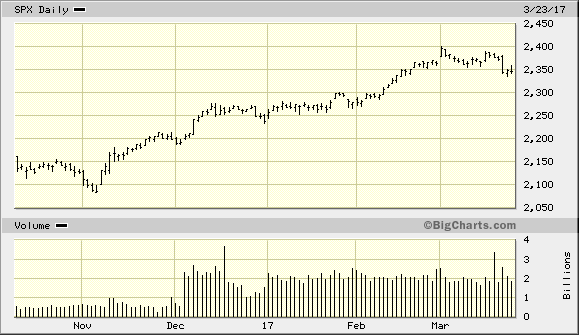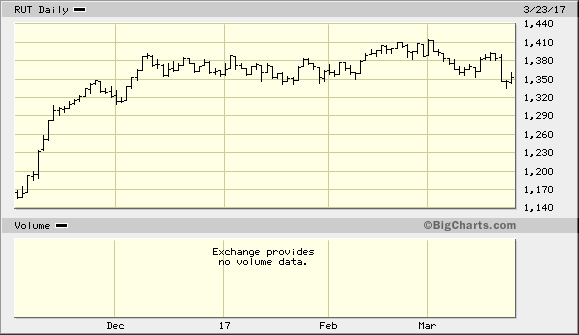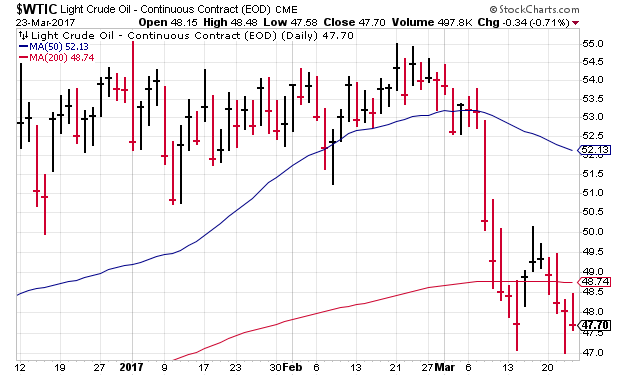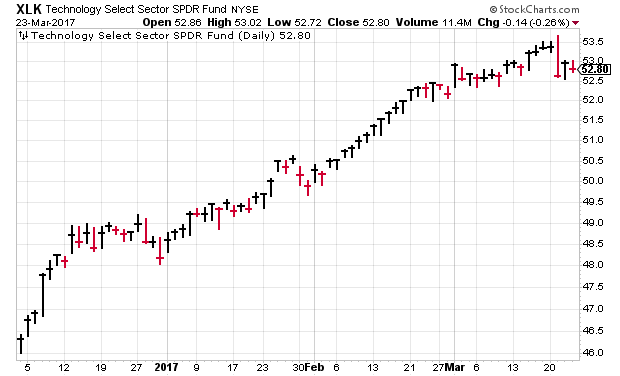CWS Market Review – March 24, 2017
“If you have trouble imagining a 20% loss in the stock market, you shouldn’t be in stocks.” – Jack Bogle
The streak finally came to an end. On Tuesday, the stock market did something it hadn’t done in the previous 109 trading days. It closed down by more than 1%.
This was the longest such hot streak in more than 20 years, and it was close to becoming the longest in over 50 years. If we look more closely, the recent streak was even more impressive because there were only two days in which the S&P 500 fell more than 0.7%. Of course, we have to remember that not that long ago, a 1% drop was barely a scratch. In 2008, it happened 75 times.
As we know well, Wall Street has a notoriously poor memory.
So, is this the beginning of the end? Have the walls come crashing down? Eh…probably not. Bear in mind that the Trump Rally has endured four North Korean missile launches, two Fed rate hikes, and of course, President Trump himself. Through all that, it’s quietly powered ahead.
But this may be the end of the Trump Trade. It’s a little more complicated than has often been portrayed. I’ll explain what it all means. I’ll also cover some of the recent stories impacting our Buy List stocks. But first, let’s look at the fading Trump Trade.
The Death of the Trump Trade
While there’s been a lot of talk of the Trump Trade, properly speaking, there were two separate trades in recent months.
The first Trump Trade came immediately after the election. That’s when stocks soared. The stock rally was matched by a big downturn for bonds. Within a few days, the yield on the 10-year Treasury jumped from around 1.8% to close to 2.3%. That’s an unusually large move for such a short period of time. Combine that with the fact that the 10-year yield had been creeping higher since the summer, and you can see how dramatically the interest-rate outlook had changed.
Within the stock sectors, the small-caps saw the biggest gains. On November 3, the Thursday before the election, the Russell 2000 stood at 1,156.89 (see below). By November 25, the index had risen to 1,347.20. That’s a jump of more than 16% in just over three weeks. That’s a huge leap for an entire size category.
Among stock sectors, the big winners were Industrials and Financials. The move in the latter was astounding. On our Buy List, shares of Signature Bank (SBNY) soared 21% in four days. Prior to the election, Goldman Sachs warned of dire consequences if Trump were to be elected. That outcome, apparently, didn’t include a massive rally in shares of Goldman. Shares of GS gained more than 60% in the second half of 2016. (The bank’s former COO, Gary Cohn, is now President Trump’s top economic advisor.)
Here’s what was happening. This first stage of the Trump Rally was based on the idea of a markedly improving economy. Traders thought policies in Washington would shift towards fiscal stimulus. That’s why the Cyclicals stocks led the way. The yield curve widened, and defensive areas like Utilities and Staples didn’t fare so well.
But by early December, that stage of the rally had petered out. By December 13, the S&P 500 had reached a near-term peak of 2,271.72. The stock market was pretty flat for a few weeks after that. By Inauguration Day, the S&P 500 closed at 2,271.31.
Stage Two of the Trump rally really got going in February. This second stage was led by large-cap tech stocks. Unlike stage one, this time the long end of the bond market was relatively stable. The yield on the 10-year bond peaked around mid-December and has mostly been in a trading range since then (between 2.3 and 2.6%).
Instead, the interest-rate action has been at the short end. The second stage of the Trump Rally happened at the same time there was a perceived need for higher interest rates. This is when we saw yields at the short end of the yield curve touch levels they hadn’t seen in seven or eight years. This move in the market foreshadowed last week’s Fed rate hike. In fact, it also caused traders to think more hikes were on the way.
But now, that thesis is starting to show holes. For one, we can’t help noticing the price of oil. One month ago, West Texas Crude got as high as $54.45 per barrel. Everything was going right for OPEC. The production cuts were holding. Finally! But the latest numbers show that there’s still an oil glut. In fact, it’s a big one, and the oil markets are taking notice. At one point, the price of oil fell ten times in eleven days. This week, West Texas Crude came close to falling below $47 per barrel.
Goldman Sachs noted that OPEC’s production cut has had an unintentional side effect—it has spurred the biggest productions in history. It’s hard to say that the Fed needs to raise interest rates to combat inflation when the price of oil is dropping.
Both parts of the Trump Rally have seen rising share prices and low volatility. If I had to pinpoint a single day when the Trump Rally peaked, it would probably be the day after President Trump’s congressional address. Traders loved the speech. The Dow shot up 300 points the following day.
Since then, however, the market has had a tough time getting its footing, and some cracks are starting to show. For example, 217 stocks in the S&P 500 are currently below their 50-day moving average. The overall index is just 0.72% above its 50-DMA. There are now 171 stocks in the index that are more than 10% below their 52-week high, which is the traditional definition of a market correction. In other words, more than one-third of the index is effectively in a correction already.
On Tuesday, the S&P 500 lost 1.24%. Ryan Detrick notes that the average worst day of the year is three times worse than Tuesday’s loss, which is our current worst day of the year. It wasn’t bad, but it was different from the trend, and that’s what catches our attention. The Nasdaq Composite, actually, hit a new all-time high on Tuesday, which shows the impact of large-cap tech.
So stage one of the Trump Rally (November and December) was about a resurgent economy. Stage two (February) was about taking on more risk due to higher rates.
What to do now: I’m still holding onto my view that stocks are due for a modest pullback. It may have already started, since the S&P 500 has now gone three weeks without making a new high. But let me caution you not to worry. I’m not expecting a major decline.
Make sure that you’re well diversified and look for decent dividends. Microsoft (MSFT), for example, currently yields 2.4%. Cinemark (CNK) yields close to 2.7%. I think there’s a very good chance that we’ll be looking at a lot of bargains in the spring. Now let’s look at some news affecting our Buy List stocks.
Buy List Updates
Sherwin-Williams (SHW) said the acquisition of Valspar will take longer than expected. It doesn’t seem to be a major problem. They have to work through some divestitures. Originally, Sherwin thought the deal would close by April. Now they’re thinking it will be June. Going into the deal, SHW knew they were going to have to sell off some units to appease regulators. They just didn’t know what. Don’t let this news worry you. Sherwin-Williams is doing fine.
HEICO (HEI) announced a 5-for-4 stock split. This means investors will get an extra share for every four they currently own. The share price will be expected to fall about 20%. The semi-annual dividend will stay at nine cents per share, so that’s effectively a 25% increase.
I’m never sure why companies like to do small splits like this. If I had my way, only 2-for-1 splits or higher would be allowed, and the share price needs to be over $100. This will be HEICO’s 15th stock split since 1995. The split is payable on April 18 to shareholders of record as of April 7. Cash will be paid in lieu of fractional shares. If you had invested $100,000 in HEICO in 1990, today it would be worth $18.7 million.
That’s all for now. Next week is the final week of the first quarter. On Thursday, the government will update the Q4 GDP report for a second time. Before that, on Tuesday, we’ll get the report on consumer confidence for March. Then on Friday, we’ll get the reports on personal income and spending for February. Be sure to keep checking the blog for daily updates. I’ll have more market analysis for you in the next issue of CWS Market Review!
– Eddy
Posted by Eddy Elfenbein on March 24th, 2017 at 7:09 am
The information in this blog post represents my own opinions and does not contain a recommendation for any particular security or investment. I or my affiliates may hold positions or other interests in securities mentioned in the Blog, please see my Disclaimer page for my full disclaimer.
-
-
Archives
- April 2025
- March 2025
- February 2025
- January 2025
- December 2024
- November 2024
- October 2024
- September 2024
- August 2024
- July 2024
- June 2024
- May 2024
- April 2024
- March 2024
- February 2024
- January 2024
- December 2023
- November 2023
- October 2023
- September 2023
- August 2023
- July 2023
- June 2023
- May 2023
- April 2023
- March 2023
- February 2023
- January 2023
- December 2022
- November 2022
- October 2022
- September 2022
- August 2022
- July 2022
- June 2022
- May 2022
- April 2022
- March 2022
- February 2022
- January 2022
- December 2021
- November 2021
- October 2021
- September 2021
- August 2021
- July 2021
- June 2021
- May 2021
- April 2021
- March 2021
- February 2021
- January 2021
- December 2020
- November 2020
- October 2020
- September 2020
- August 2020
- July 2020
- June 2020
- May 2020
- April 2020
- March 2020
- February 2020
- January 2020
- December 2019
- November 2019
- October 2019
- September 2019
- August 2019
- July 2019
- June 2019
- May 2019
- April 2019
- March 2019
- February 2019
- January 2019
- December 2018
- November 2018
- October 2018
- September 2018
- August 2018
- July 2018
- June 2018
- May 2018
- April 2018
- March 2018
- February 2018
- January 2018
- December 2017
- November 2017
- October 2017
- September 2017
- August 2017
- July 2017
- June 2017
- May 2017
- April 2017
- March 2017
- February 2017
- January 2017
- December 2016
- November 2016
- October 2016
- September 2016
- August 2016
- July 2016
- June 2016
- May 2016
- April 2016
- March 2016
- February 2016
- January 2016
- December 2015
- November 2015
- October 2015
- September 2015
- August 2015
- July 2015
- June 2015
- May 2015
- April 2015
- March 2015
- February 2015
- January 2015
- December 2014
- November 2014
- October 2014
- September 2014
- August 2014
- July 2014
- June 2014
- May 2014
- April 2014
- March 2014
- February 2014
- January 2014
- December 2013
- November 2013
- October 2013
- September 2013
- August 2013
- July 2013
- June 2013
- May 2013
- April 2013
- March 2013
- February 2013
- January 2013
- December 2012
- November 2012
- October 2012
- September 2012
- August 2012
- July 2012
- June 2012
- May 2012
- April 2012
- March 2012
- February 2012
- January 2012
- December 2011
- November 2011
- October 2011
- September 2011
- August 2011
- July 2011
- June 2011
- May 2011
- April 2011
- March 2011
- February 2011
- January 2011
- December 2010
- November 2010
- October 2010
- September 2010
- August 2010
- July 2010
- June 2010
- May 2010
- April 2010
- March 2010
- February 2010
- January 2010
- December 2009
- November 2009
- October 2009
- September 2009
- August 2009
- July 2009
- June 2009
- May 2009
- April 2009
- March 2009
- February 2009
- January 2009
- December 2008
- November 2008
- October 2008
- September 2008
- August 2008
- July 2008
- June 2008
- May 2008
- April 2008
- March 2008
- February 2008
- January 2008
- December 2007
- November 2007
- October 2007
- September 2007
- August 2007
- July 2007
- June 2007
- May 2007
- April 2007
- March 2007
- February 2007
- January 2007
- December 2006
- November 2006
- October 2006
- September 2006
- August 2006
- July 2006
- June 2006
- May 2006
- April 2006
- March 2006
- February 2006
- January 2006
- December 2005
- November 2005
- October 2005
- September 2005
- August 2005
- July 2005




 Eddy Elfenbein is a Washington, DC-based speaker, portfolio manager and editor of the blog Crossing Wall Street. His
Eddy Elfenbein is a Washington, DC-based speaker, portfolio manager and editor of the blog Crossing Wall Street. His